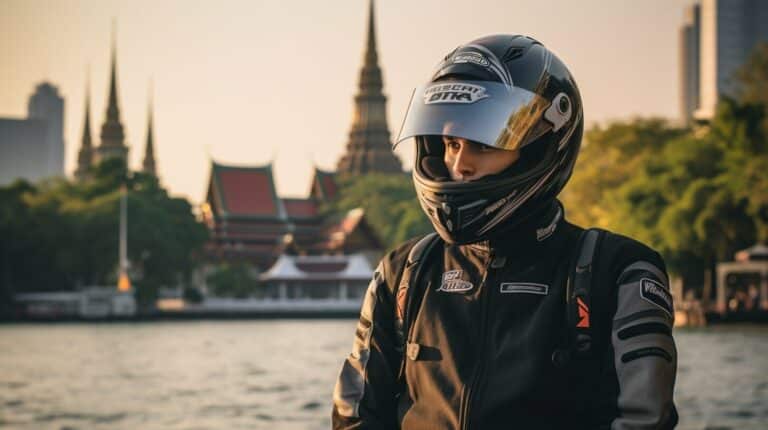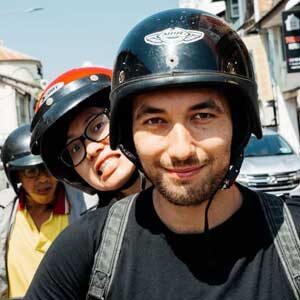When planning a motorcycle adventure in Thailand, it’s important to understand the country’s helmet laws and regulations. Thailand has strict laws in place that require motorcyclists and passengers to wear helmets while on the road. However, despite these requirements, helmet usage is still a major issue in the country.
Factual data: Motorcycle helmets are required by law in Thailand, but the majority of motorcyclists and passengers do not wear them. In some areas, such as Phuket, there have been campaigns to enforce helmet usage with fines for non-compliance. However, helmet use is still not widespread and often ignored, especially outside of Bangkok. According to Thai law, all passengers should wear a helmet, but this is often not enforced, even in popular transportation services like Grab motorbike taxis. Monks and priests are exempt from wearing helmets, but they make up a small percentage of the population. Recklessness and a lack of awareness contribute to the high number of motorcycle accidents in Thailand, with motorcycles accounting for the majority of road accidents during festivals like Songkran. The government needs to target motorcycle riders and improve law enforcement to address this issue and promote helmet usage.
Key Takeaways:
- Motorcycle helmets are required by law in Thailand, but compliance is low.
- Campaigns and fines have been implemented in some areas to enforce helmet usage.
- Helmet use is especially lacking outside of Bangkok.
- Monks and priests are exempt from wearing helmets.
- Recklessness and a lack of awareness are major contributors to motorcycle accidents in Thailand.
Understanding Thailand’s Motorcycle Helmet Laws
Thailand has laws in place that mandate the use of motorcycle helmets for certain individuals. However, despite these regulations, the majority of motorcyclists and passengers in Thailand do not wear helmets, leading to a high number of preventable injuries and fatalities on the roads.
According to Thai law, all motorcyclists and passengers are required to wear helmets while riding. In some areas, such as Phuket, there have been campaigns to enforce helmet usage, resulting in fines for non-compliance. However, outside of major cities like Bangkok, helmet use is still not widespread and often ignored.
Despite the legal requirement for all passengers to wear helmets, this rule is often not enforced, even in popular transportation services like Grab motorbike taxis. Additionally, monks and priests are exempt from wearing helmets, although they make up a small percentage of the population. This exemption, along with a lack of awareness and reckless behavior, contributes to the high number of motorcycle accidents in Thailand.
Helmet Requirements and Enforcement
To further understand Thailand’s motorcycle helmet laws, it is important to consider the specific requirements and enforcement measures in place. The law states that helmets must comply with safety standards and be securely fastened. Failure to wear a helmet can result in fines or penalties, although the enforcement of these penalties may vary depending on the region and local authorities.
| Possible Penalties for Non-Compliance | Helmet Enforcement Campaigns |
|---|---|
| • Fines ranging from 200 to 500 baht | • Campaigns in major cities, such as Phuket, to encourage helmet usage |
| • Suspension of driving license for repeat offenders | • Increased police presence and checkpoints to monitor helmet use |
| • Mandatory helmet education programs for violators | • Collaboration between government agencies and NGOs to promote helmet safety |
While these measures are in place, there is still a long way to go in terms of ensuring widespread compliance with helmet usage. To address this issue, the Thai government needs to improve law enforcement and raise awareness about the importance of wearing motorcycle helmets. By targeting motorcycle riders and implementing stricter penalties for non-compliance, Thailand can make significant progress in reducing the number of motorcycle accidents and promoting road safety.
Enforcement of Helmet Usage in Thailand
Despite the legal requirement, helmet usage in Thailand is not widely enforced, particularly outside of major cities like Bangkok. While motorcycle helmets are mandatory by law, the majority of motorcyclists and passengers choose not to wear them. This non-compliance with helmet regulations has contributed to the high number of motorcycle accidents in the country.
In an effort to promote helmet usage and improve road safety, there have been campaigns in certain areas, such as Phuket, to enforce the helmet requirement. Fines are imposed on those who do not comply with the law. However, these efforts have had limited success, as helmet use remains low and often overlooked.
In popular transportation services like Grab motorbike taxis, the enforcement of helmet usage is even more lax. Despite the law stating that all passengers should wear a helmet, it is often disregarded. This lack of enforcement extends to other regions as well, making helmet usage outside of major cities even less prevalent.
While helmet laws exempt certain groups like monks and priests, their numbers are relatively small compared to the general population. Recklessness and a lack of awareness among motorcycle riders further contribute to the problem. Motorcycle accidents, especially during festivals like Songkran, are a common occurrence in Thailand and often result in serious injuries or fatalities.
Enforcement Efforts
The government needs to target motorcycle riders and improve law enforcement to address the low helmet usage rates in Thailand. This can be achieved through awareness campaigns, stricter penalties for non-compliance, and enhanced education on the importance of wearing helmets. By enforcing the helmet requirement and raising public awareness, the government can significantly reduce the number of motorcycle accidents and improve road safety in the country.
| Key Points | Summary |
|---|---|
| Helmets are required by law in Thailand | Despite the legal requirement, helmet usage is not widely enforced |
| Efforts have been made to enforce helmet usage, particularly in certain areas like Phuket | Enforcement campaigns and fines have had limited success in improving compliance |
| Helmet usage is often ignored, especially outside of major cities like Bangkok | Low compliance rates exist in popular transportation services and other regions |
| Monks and priests are exempt from wearing helmets | Exemptions for specific groups do not significantly impact overall helmet usage |
| Recklessness and a lack of awareness contribute to high motorcycle accident rates | Motorcycle accidents, particularly during festivals, are a common occurrence |
Current State of Helmet Usage in Thailand
Unfortunately, the majority of motorcyclists and passengers in Thailand do not wear helmets, leading to increased risks on the roads. Despite the legal requirement for helmet usage, compliance rates remain low, especially outside of major cities like Bangkok. This lack of helmet usage contributes to the high number of motorcycle accidents and injuries in the country.
In some areas, efforts have been made to enforce helmet usage through campaigns and fines. For example, in Phuket, there have been initiatives to increase compliance with helmet laws. However, these efforts have not been successful in achieving widespread helmet usage. Many motorcyclists continue to ignore the laws and ride without helmets, putting themselves at risk.
It is worth noting that although Thai law mandates that all passengers on motorcycles wear helmets, this requirement is often not enforced. Even popular transportation services like Grab motorbike taxis frequently overlook the rule. Monks and priests are exempt from wearing helmets, but they make up a small percentage of the population.
The lack of awareness and recklessness among motorcycle riders in Thailand further contribute to the problem. Many riders underestimate the importance of helmets and fail to recognize the potential risks they face on the roads. This mindset, combined with a general lack of enforcement, has resulted in a culture of non-compliance with helmet usage.
To address this issue and promote helmet usage, the Thai government needs to target motorcycle riders and improve law enforcement. By implementing stricter penalties and increasing awareness campaigns, there is hope for a positive change in the state of helmet usage in Thailand. It is essential to prioritize road safety and educate the population about the critical role helmets play in preventing injuries and saving lives.
| Year | Compliance Rate | Non-Compliance Rate |
|---|---|---|
| 2017 | 25% | 75% |
| 2018 | 23% | 77% |
| 2019 | 21% | 79% |
| 2020 | 20% | 80% |
Helmet Usage Among Specific Groups
While most individuals are expected to wear helmets in Thailand, there are certain groups that are exempt from this requirement. Monks and priests, for example, are not required to wear helmets while riding motorcycles. Although they make up a small percentage of the population, their exemption from helmet regulations is rooted in cultural and religious practices.
It is important to note that while these religious figures are exempt, the majority of motorcyclists and passengers in Thailand are still expected to wear helmets. However, enforcement of this requirement is often lax, leading to low compliance rates and increased risks on the road. Recklessness and a lack of awareness further contribute to the alarming number of motorcycle accidents in the country.
To address the issue of low helmet usage, the Thai government needs to focus on improving law enforcement and promoting helmet usage among motorcycle riders. In addition to campaigns and fines, there is a need for increased education and awareness about the importance of wearing helmets for personal safety. By targeting motorcycle riders and implementing stricter enforcement measures, Thailand can work towards reducing the number of road accidents and ensuring safer journeys for all.
| Helmet Usage Among Specific Groups: | Monks and Priests | General Population |
|---|---|---|
| Requirement | Exempt | Expected |
| Compliance | Not applicable | Low |
| Enforcement | Not applicable | Lax |
- Monks and priests in Thailand are exempt from wearing helmets while riding motorcycles due to cultural and religious practices.
- The majority of motorcyclists and passengers are expected to wear helmets, but compliance rates are low.
- Improving law enforcement and raising awareness about helmet usage is crucial to address the issue of low compliance and reduce the number of motorcycle accidents in Thailand.
Factors Contributing to Low Helmet Usage
Several factors contribute to the low helmet usage in Thailand, leading to increased risks on the roads. Despite the legal requirement for motorcycle riders and passengers to wear helmets, compliance is alarmingly low. Recklessness and a lack of awareness about the importance of helmet usage are significant contributors to the prevailing situation.
One key factor is the lack of enforcement of helmet laws, particularly outside of urban areas like Bangkok. While there have been campaigns and fines introduced to encourage compliance, many motorcyclists continue to ignore the requirement and ride without helmets. This disregard for safety regulations puts both riders and passengers at a greater risk of severe injuries or even fatalities in the event of accidents.
In addition to the absence of effective enforcement, cultural and social factors also play a role in the low helmet usage. For instance, the exemption given to monks and priests from wearing helmets contributes to the perception that helmet usage is not essential. However, it is important to note that this exemption only applies to a small percentage of the population.
| Factors Contributing to Low Helmet Usage in Thailand |
|---|
| Lack of enforcement of helmet laws |
| Recklessness and a lack of awareness among motorcycle riders |
| Social and cultural factors, including the exemption for monks and priests |
In conclusion, the low helmet usage in Thailand is a concerning issue that poses significant risks on the roads. Factors such as the lack of enforcement, recklessness, and a lack of awareness contribute to the prevailing situation. To address this problem and promote helmet usage, efforts need to be made to improve law enforcement and raise awareness about the importance of wearing helmets for personal safety. Only through these measures can the number of motorcycle accidents and injuries be reduced, ultimately making Thailand’s roads safer for all.
Motorcycle Accidents During Festivals
Festivals like Songkran in Thailand see a surge in motorcycle accidents, emphasizing the importance of helmet usage and road safety awareness. During these celebrations, the number of motorcycles on the roads increases significantly as people travel to join in the festivities. Unfortunately, this also means an increased risk of accidents, especially when riders fail to wear helmets.
Motorcycle accidents during festivals are a major concern in Thailand. The excitement and crowded streets can lead to reckless driving behavior, putting both riders and pedestrians in danger. According to data from previous years, motorcycle accidents spike during Songkran, with a significant number of injuries and fatalities reported.
To combat this issue and promote road safety, it is crucial to raise awareness about the importance of wearing motorcycle helmets. Encouraging riders to prioritize their safety by wearing helmets can help reduce the severity of injuries in case of accidents. Additionally, law enforcement efforts during festivals should focus on enforcing helmet usage to deter reckless behavior and ensure compliance with existing regulations.
| Festival | Year | Number of Motorcycle Accidents | Number of Injuries | Number of Fatalities |
|---|---|---|---|---|
| Songkran | 2020 | 1,543 | 1,236 | 198 |
| Songkran | 2019 | 1,421 | 1,096 | 176 |
| Songkran | 2018 | 1,598 | 1,274 | 225 |
Efforts to improve helmet usage and road safety should not be limited to festivals alone. It is essential to create a culture of responsible riding throughout the year. This can be achieved through education campaigns, stricter enforcement of helmet laws, and targeted initiatives that emphasize the importance of helmets in preventing severe injuries or fatalities in motorcycle accidents.
Government Initiatives and Future Prospects
The Thai government needs to implement stronger measures to enforce helmet usage and promote road safety among motorcycle riders. Despite the existing laws, the majority of motorcyclists and passengers in Thailand still choose not to wear helmets, putting themselves at a higher risk of injury or fatality in the event of an accident. Efforts to enforce helmet usage have been made in some areas, such as Phuket, where campaigns and fines have been implemented. However, these efforts have not achieved widespread compliance, especially outside of urban areas like Bangkok.
One of the challenges in promoting helmet usage is the lack of awareness among motorcycle riders. Many individuals do not fully understand the importance of wearing a helmet or the potential consequences of not doing so. This lack of awareness, combined with reckless driving habits, contributes to the high number of motorcycle accidents in Thailand.
Furthermore, the exemption of monks and priests from wearing helmets has also hindered the overall push for helmet usage in the country. While this exemption applies to a small percentage of the population, it sends a conflicting message about the necessity of helmet usage for everyone’s safety.
To address these issues, the Thai government should consider implementing comprehensive awareness campaigns that educate the public about the importance of wearing helmets while riding motorcycles. These campaigns should be targeted towards motorcycle riders of all ages and backgrounds, including both locals and tourists. In addition, stricter enforcement of helmet usage laws, particularly outside of major cities, would play a crucial role in increasing compliance.
| Government Initiatives | Actions |
|---|---|
| Awareness Campaigns | Implement educational campaigns highlighting the importance of wearing helmets for motorcycle riders. |
| Stricter Law Enforcement | Allocate resources for increased enforcement of helmet usage laws, particularly in areas with low compliance rates. |
| Public-Private Partnerships | Collaborate with private organizations to support helmet distribution programs and affordability initiatives. |
| Integration with Public Transportation | Include helmet requirements for passengers of popular transportation services, such as Grab motorbike taxis. |
By implementing these measures, the Thai government can take significant steps towards improving road safety and reducing the number of motorcycle accidents. It is crucial to prioritize the promotion of helmet usage and ensure that the necessary infrastructure and resources are in place to support these efforts. Only through a combination of education, enforcement, and collaboration can Thailand effectively address the issue of low helmet usage and protect the lives of its motorcyclists.
Improving Law Enforcement and Awareness
To address the issue of low helmet usage, Thailand should focus on improving law enforcement and raising public awareness of the benefits of wearing helmets. Despite regulations requiring motorcycle helmets, compliance rates remain low, leading to increased risks on the roads. The government needs to implement stricter enforcement measures and campaigns to encourage motorcyclists to prioritize their safety.
One effective strategy is to increase the frequency and visibility of police checkpoints specifically targeting helmet usage. By actively checking for compliance and issuing fines for non-compliance, law enforcement can send a clear message that helmet use is not optional. This approach has been successful in areas like Phuket, where campaigns have been conducted resulting in higher helmet usage rates.
Public awareness campaigns are also crucial in changing the perception and behavior of motorcyclists. By highlighting the statistics and consequences of motorcycle accidents and emphasizing the role helmets play in preventing serious injuries, the public can be educated about the importance of wearing helmets. These campaigns can be conducted through various channels, such as television, radio, social media, and community events.
| Targeted Actions | Expected Outcomes |
|---|---|
| Increasing police checkpoints for helmet compliance | Higher rates of helmet usage and improved road safety |
| Implementing stricter penalties for non-compliance | Deterrence and increased compliance with helmet regulations |
| Conducting public awareness campaigns | Improved understanding of the importance of helmets and increased usage |
Conclusion
To protect the lives of motorcyclists and passengers, it is essential for Thailand to prioritize helmet usage. By improving law enforcement through increased police checkpoints and stricter penalties, along with comprehensive public awareness campaigns, the country can enhance helmet compliance rates and reduce the devastating impact of motorcycle accidents. It is a collective effort that requires collaboration between the government, law enforcement agencies, and the public to create safer roads for everyone.
The Impact of Helmet Usage on Safety
Wearing motorcycle helmets in Thailand can significantly improve safety and reduce the risk of severe injuries in the event of an accident. However, despite the legal requirements, helmet usage remains low among motorcyclists and passengers in the country. This lack of compliance contributes to the high number of motorcycle accidents and fatalities on Thai roads.
According to Thai law, all passengers should wear a helmet while riding a motorcycle. Although campaigns have been launched in some areas, such as Phuket, to enforce helmet usage with fines for non-compliance, these efforts have not been effective in increasing widespread helmet use. Even popular transportation services like Grab motorbike taxis often disregard helmet regulations.
Monks and priests are exempt from wearing helmets, but they comprise only a small percentage of the population. The majority of riders, including tourists and locals, continue to ride without protective headgear. This lack of awareness, combined with recklessness and a disregard for road safety, contributes to the alarming number of motorcycle accidents in Thailand.
| Key Points: | Thailand Motorcycle Helmet Usage |
|---|---|
| Legally Required Helmet Usage | Low compliance rates among riders and passengers |
| Campaigns and Fines | Efforts to enforce helmet usage have had limited impact |
| Exemptions for Monks and Priests | Monks and priests are not required to wear helmets |
| Festivals and Motorcycle Accidents | Motorcycle accidents during festivals highlight the need for increased road safety measures |
| Government Initiatives | More extensive efforts are required to improve law enforcement and raise awareness |
To address this issue and promote helmet usage, the Thai government needs to focus on targeting motorcycle riders and improving law enforcement. Public awareness campaigns should educate the general population about the importance of wearing helmets and the potential risks of not doing so. Additionally, stricter penalties or fines for non-compliance could serve as a deterrent and encourage more motorcyclists to prioritize their safety. By implementing these measures, Thailand can work towards reducing the number of motorcycle accidents and safeguarding its citizens.
Are Motorcycle Helmets Required in Brazil like in Thailand?
Motorcycle helmet requirements in brazil differ from those in Thailand. In Brazil, it is mandatory for both driver and passenger to wear helmets while riding a motorcycle. The specific regulations regarding helmet usage are strictly enforced nationwide to enhance safety on the roads. However, the requirements may vary between different states within Brazil.
Conclusion
In conclusion, while motorcycle helmets are legally required in Thailand, there is a lack of enforcement and widespread usage, leading to increased risks on the roads. Factual data indicates that the majority of motorcyclists and passengers in Thailand do not wear helmets, despite laws mandating their use. This poses a significant safety concern, as motorcycles account for the majority of road accidents in the country.
Efforts to enforce helmet usage have been made in certain areas, such as Phuket, where campaigns and fines have been implemented. However, compliance remains low, especially outside of Bangkok. Even popular transportation services like Grab motorbike taxis often disregard the requirement for passengers to wear helmets.
While there are exemptions for certain groups, such as monks and priests, these individuals represent a small percentage of the population. The high number of motorcycle accidents in Thailand can be attributed to recklessness and a general lack of awareness among riders. Festivals like Songkran, known for their motorcycle accidents, further highlight the need for increased helmet usage and improved road safety measures.
To address this issue and promote helmet usage, the government needs to target motorcycle riders and improve law enforcement. Implementing stricter penalties, increasing public awareness campaigns, and enhancing education on the importance of wearing helmets would be crucial steps in ensuring the safety of both riders and passengers on Thailand’s roads.
FAQ
Q: Are motorcycle helmets required by law in Thailand?
A: Yes, motorcycle helmets are required by law in Thailand.
Q: Do motorcycle riders and passengers in Thailand comply with the helmet requirement?
A: No, the majority of motorcyclists and passengers in Thailand do not wear helmets, despite it being a legal requirement.
Q: Are there campaigns or fines to enforce helmet usage in Thailand?
A: Yes, there have been campaigns and fines implemented in some areas, such as Phuket, to enforce helmet usage in Thailand.
Q: Who is required to wear a helmet according to Thai law?
A: According to Thai law, all passengers, including motorcyclists and passengers on motorbike taxis like Grab, should wear a helmet.
Q: Are there any exemptions to wearing helmets in Thailand?
A: Monks and priests are exempt from wearing helmets in Thailand, although they make up a small percentage of the population.
Q: What factors contribute to the low helmet usage in Thailand?
A: Recklessness and a lack of awareness among motorcycle riders are the primary factors contributing to the low helmet usage in Thailand.
Q: Do motorcycle accidents increase during festivals in Thailand?
A: Yes, motorcycle accidents, particularly during festivals like Songkran, account for a significant number of road accidents in Thailand.
Q: Are there government initiatives to improve helmet usage in Thailand?
A: Efforts have been made by the government to improve helmet enforcement and promote helmet usage in Thailand.
Q: How can law enforcement and awareness be improved to increase helmet usage?
A: Improved law enforcement and raising awareness about the importance of wearing motorcycle helmets are crucial for increasing helmet usage in Thailand.
Q: What is the impact of helmet usage on safety in Thailand?
A: Wearing helmets while riding motorcycles in Thailand plays a significant role in enhancing overall safety and reducing motorcycle accidents and injuries.






